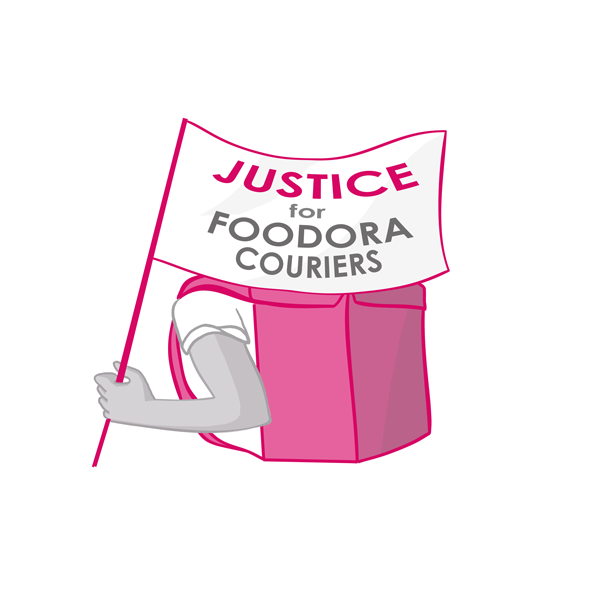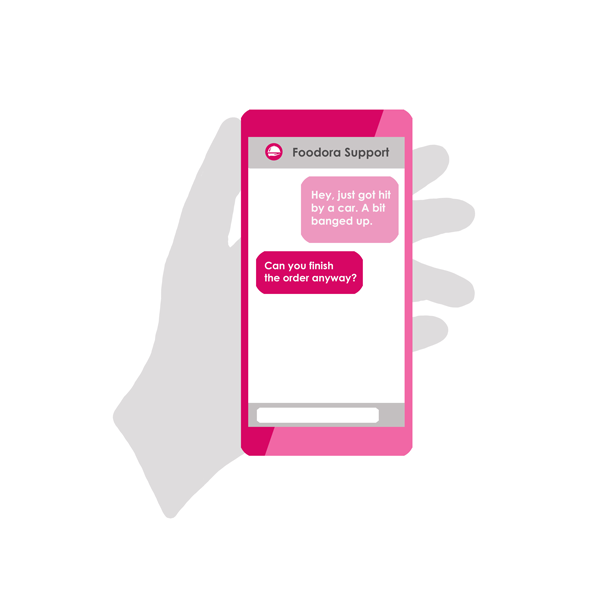



Foodora classifies couriers as independent contractors to avoid the legal obligation to pay for basic benefits (that employees have a right to) such as EI. It also means we have no basic labour rights, including the right to organize. But in fact Foodora controls most of the our work: they determine scheduling, and administer discipline like any other boss. Their abuse of the ‘independent contractor’ classification puts all the financial and physical risks on the couriers, while Foodora keeps the majority of the rewards.
This experience is sadly common: A courier is hit by a car and then asked by our dispatcher to complete an order anyway. We are penalized if we don’t or can’t comply. This is because Foodora treats us like data points in their algorithm. We are not entitled to breaks and we have no bathroom or warm-up facilities.
We know that the best way to get the respect we deserve is to get the protection that a union brings, and negotiate our working conditions with Foodora.
Being a bike courier in Toronto is just plain dangerous. Driving a car for work on Toronto streets is risky too.
Too many cyclists are injured or killed in this city. We do our best to keep ourselves safe, but ask any bike courier who has been working for a while and they will tell you how many times they’ve hit by a door, stuck in a streetcar track or in some cases, intentionally run off the road. To make matters worse, the Foodora platform is busiest when weather conditions are especially difficult. We often feel that Foodora is pushing us into harm’s way.
Those of us driving cars are vulnerable to accidents too, and pressured to sacrifice safety to meet tight deadlines. When we do everything we can to be safe, we are penalized by the company. We’re expected to answer texts from the company while on the road, breaking the law and affecting our safety. Many of us have had orders canceled after driving multiple kilometers through traffic, just because we wouldn’t respond to a dispatcher text while at the wheel.
When we’re been injured, we have the option to apply for WSIB. But WSIB can be inadequate and difficult to get. We have no coverage for rehabilitative supports such as physiotherapy or pharmaceutical coverage. We pay out of pocket for everything, or we live with permanent health issues. We don’t have paid sick days, family leave, or vacation, so we are working sick or injured in order to keep the rent paid.
But once we have bargaining power, we could change all this: There is much more the company could afford to do. Foodora could provide extended health benefits, more safety equipment, and amenities. An employer should invest in the total well-being of its employees especially in such dangerous jobs.
Since Foodora came to Toronto, the rates have remained the same for couriers. For every order made on foodora, the restaurant pays the company 30%, the customer pays the delivery fee of $4.50, and all that foodora pays to the couriers is $1/km for the drop-off of the food.
We have not seen an increase in 3 years - which means we’re making less, relative to the cost of living. We are not paid at all for pick-up travel (from wherever we are when receiving the order to the restaurant). We do not have guaranteed shifts, and no minimum wage if it happens to be slow - meaning zero guaranteed income. When an order hasn’t come or when the food isn’t yet ready, we burn time without pay. We pay the costs of maintenance of our own bikes and cars, gas and insurance, and even parking and traffic tickets.
Also, Foodora’s tipping system does not work for couriers because customers are given the impression that the amount they are paying for delivery is like a ‘tip’. And the application will only accept an additional tip before the order is submitted. Most of the time, the delivery fee plus $1/km for distance to drop-off is all we are paid.
To gain fair compensation, we need to bargain collectively, so that Foodora can’t set us in competition against each other.

Around the world, couriers and other gig economy workers are organizing for better working conditions and respect. We are challenging companies for treating workers as disposable, and we are winning improvements.Foodora Canada has invested heavily in their Toronto operations; they have the means to meet our modest demands.
Foodora can do the right thing, but we have to demand it and stand up for ourselves and each other.
A collective agreement gives you a say in your rights, your wages and your safety.
4.5 million workers have made the choice to join a union.
Together we are strong!
|
Money |
Unionized workers make $5.11 per hour more than non-union workers. Collective bargaining ensures your wages get increased regularly. |
|
Benefits |
Almost 20% more unionized workers have benefits like drug, vision and dental plans than non-union workers. |
|
Pensions |
Approximately 48% more unionized workers have a pension plan than non-union workers. |
|
Safety |
Research shows unionized workplaces tend to report higher compliance with health and safety legislation than non-union workplaces. Union contracts can also have health and safety clauses that are above minimum standards. |
|
Dignity |
Unionized workers have protection against arbitrary decisions by bad bosses. through the grievance-arbitration system, workers can challenge decisions that violate their contract. |
|
Seniority |
Many union contracts have seniority provisions, which ensure fairness rather than favouritism when it comes to hours of work, overtime, vacation schedules and job postings. |
|
Job security |
Union contracts have protection against unjust dismissal. |
|
Equity |
Union contracts help protect against discrimination and harassment. This helps create a positive working environment for everyone. |

CUPW believes that all delivery workers should be treated with respect, whether they travel by bike, car, scooter, or electric unicycle! CUPW has represented couriers across the country, including bike and car couriers. They understand the industry, and know that companies like Foodora push down working conditions for all workers. That hurts all of us. 54,000 members strong, CUPW has been helping couriers organize since 1999, and can support us in achieving our demands.
Foodora couriers are meeting together, sharing experiences, and signing union cards to gain recognition with the Canadian Union of Postal Workers (CUPW). Here’s how you can get involved:
Step 1: Contact an organizer today to learn more and sign a union card.
Text 647-499-2259 or click "JOIN NOW" to have someone contact you.
Step 2: Ask your fellow couriers to do the same!
Step 3: Come out to the next General Meeting and get involved in your union!
Workers have the right to a healthy and safe workplace. Requirements are laid out in workplace health and safety laws, which vary depending on your province and jurisdiction. Generally, workers in Canada have the right to know about workplace hazards and the right to participate in decisions that affect their health and safety at work.
Unionized work sites generally have health and safety requirements that are greater than the minimum legislation. If you need more information about joining a union and/or health and safety regulations in your own province or territory, be sure to get in touch.
Many companies will misclassify employees as independent contractors in order to avoid basic employment and labour standards. This is a good deal for the company because it can ignore rules such as maximum hours of work, overtime, vacation pay, holidays, and termination or severance pay. Employers also skip contributing their share of Employment Insurance (EI), Canada Pension Plan (CPP) and Workers Compensation premiums.
The real tests to figure out whether you're an employee involve an analysis of whether the company controls your work, who owns the tools and equipment for the work and whether the worker has the chance of profit or risk of loss as a result of his or her job. CUPW has brought the cases of many "independent contractors" to labour boards and tribunals. In most cases, the workers were recognized as employees or dependent contractors. We can help you determine whether you're an employee in disguise. Contact us for more information.
There's definitely something you can do. All thirteen jurisdictions in the country have some type of equal pay requirements in human rights legislation, employment standards legislation, and/or pay equity legislation. We can help you evaluate your options. Call us at 647-499-2259 if you think women who are doing similar work in your workplace are getting paid less than men.
Unions are also a great way to reduce the difference between what men and women get paid. Women earn 94% as much as their male counterparts in unionized jobs. The figure for women in non-union work is a measly 79%.

Show you are union and proud on the streets! Come out to an upcoming meeting or contact [email protected] to order a Justice for Foodora couriers t-shirt, spokecard, button, flyers and more.